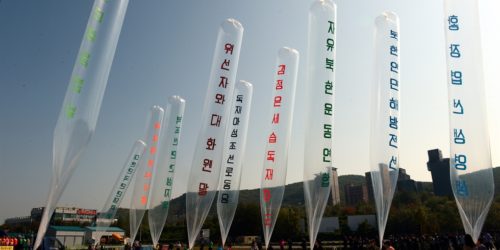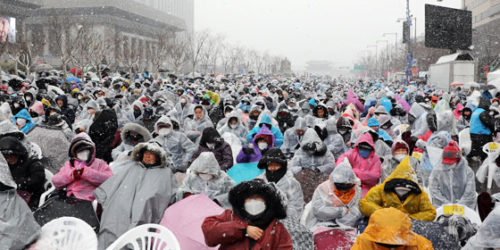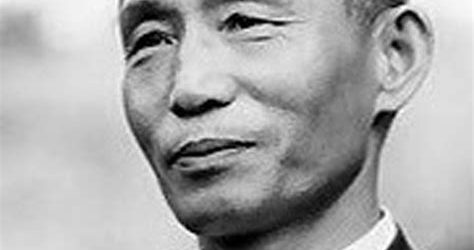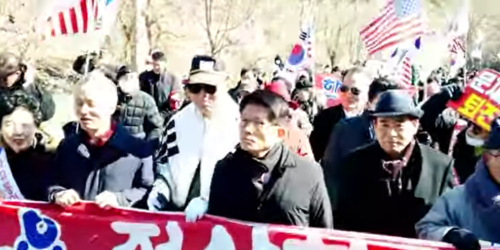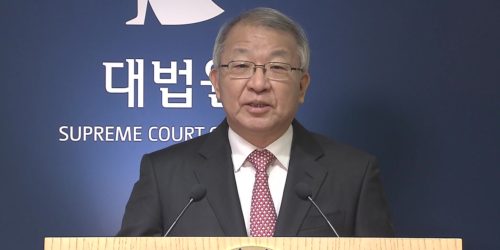A Young Energetic IT attorney, Will Fraud in South Korea’s 2020 Election be Uncovered? Kim Moon-Soo TV
2020-5-26, Kim Moon-Soo TV (김문수TV, a YouTube Channel) [Translation]
[Note: Kim Moon-Soo (김문수) is a former Governor of Gyeonggi Province and former National Assemblyman with the Saenuri Party, forerunner of the Liberty Korea Party. Earlier this year, the latter merged with the Correct Future Party to become the United Future Party (also referred to as the Future Integration Party, 미래통합당). Kim left the party earlier this year. Kim also was a labor activist during his student days, helped form various labor unions, and supported socialism. He has since converted and now strongly supports liberal democracy and the alliance with the U.S.
Attorney Lee Dong-Hwan (이동환) is currently working with 50 other lawyers to file lawsuits to preserve evidence of election fraud, such as election documents, ballots, ballot boxes, vote counting machine, laptops, and other IT equipment used during the elections, as well as to nullify the results of the April 15, 2020 general election. Many judges have rejected the request to preserve digital voting equipment. The effort is led by former National Assemblyman Min Kyung-Wook (민경욱) of the United Future Party (his term ended on May 29, 2020), 24 other candidates who ran for office on April 15, 3,000 watchful citizens, and 51 lawyers above.
On May 21, 2020, Min Kyung-Wook was investigated by the Uijeongbu District Prosecutors’ office Division 6, while he was still a National Assemblyman, in relation to the six ballots he produced to show the constituents that the ballots in one district ended up in another district, as one of many instances of ballot fraud. The National Election Commission (NEC), instead of investigating why and how the ballots ended up in another district, sued Min for “stealing the ballots.”]
(4:20) Kim Moon-soo: The election is a problem, but National Assemblyman Min Kyung-wook [who raised the issue of election fraud], was charged with a crime for stolen items and was searched, because he presented to the public 6 ballots [that belonged to one district that were found in another district], that certainly is evidence of a fraudulent election.
(4:41) Attorney Lee Dong-hwan: Such a [charge and search] should not have occurred. I think that is the use of “violence” by the prosecutor.
(4:49) Kim Moon-soo: It was the National Election Commission (NEC) that charged him.
Attorney Lee Dong-hwan: The NEC asked the Chief Prosecutor to investigate, but in reality, they designated Rep. Min as a suspect. The prosecutor was conducting an investigation and called Rep. Min as a witness, but it is possible for the prosecutor to start treating him as a suspect. Right after Rep. Min provided his testimony as a witness, the prosecutor presented a warrant and searched him physically on the spot. The prosecutor also claimed that they can physically search the lawyer who went with Rep Min. This [behavior] is just unheard of. The prosecutor abused his authority, even taking away the lawyer’s rights. The other lawyers were all shocked when they heard of this occurrence. We told what happened to the Chairman of the Korean Bar Association’s (KBA) Human Rights Committee (대한변협 인권위), so the KBA will make an announcement shortly. I also was notified that the Seoul Bar Association (SBA) will also hold an emergency meeting today. [Truncated]
(6:05) Kim Moon-soo: But aren’t the Seoul Bar Association and the Korean Bar Association seized by the Minbyun and others like Moon Jae-in?
Lee Dong-hwan: Yes, I also heard that those who are close to the current administration hold key positions at the KBA, but regardless of their political stance, this is trampling on the lawyers’ rights in the Constitution. For lawyers’ associations, in order to protect their member lawyers, I think this issue must be brought up to the prosecutors and this administration.
Kim: Minbyun has over 12,000 member lawyers, and they are tightly unified. This closely-knit Minbyun-nominated Kim Seon-soo (김선수) is on the Supreme Court. Kim Myeong-soo (김명수) of Our law society is now the Chief Justice of the Supreme Court, and they [those from Minbyun and Our law society) have taken over the Supreme Court. And the Constitutional Court is taken over too, including Yoo Nam-seok (유남석). So aren’t the KBA and SBA all taken over?
Lee: Yes. Governor Kim has just pointed out a very important fact, but average citizens do not recognize this situation well. As a lawyer on the front line, I keenly feel it. After the Moon administration began, one of its first action items was to take over the judiciary branch. [The Moon administration] placed lawyers from Our law research society, Minbyun, and the International human rights law research society in key positions starting with the Supreme Court and later the Constitutional Court and the National Election Commission. I often say now we have a “5 powers fusion administration:” 1) Legislative, 2) executive, 3) Judiciary, 4) Constitutional Court, and 5) National Election Commission. The “5 powers fusion administration.” It’s like the Soviet Union’s government.
Kim Moon-soo: On top of that, the media, starting with KBS.
Lee: The media.
Kim Moon-soo: The media. And the National Assembly–OK, that’s legislative branch. And the general public organizations, starting with factories, and the labor unions–Korean Confederation of Trade Unions (KCTU), Jeongyojo (Teachers’ and Education Workers’ Union), National Union of Media Workers, etc. in large industries are also taken over. The media, labor union, production facilities, and places of business are taken over.
The greater threat than the take over of the Constitutional Court and the National Election Commission is the control of the media, including KBS, which has become a mouthpiece for the administration broadcasting fake news everyday.
Lee: And the Korea Communications Commission (KCC, 방송통신위원회) and the media.
Kim: And it’s not just the control of the KCC. On KBS, everyday they play the “Song to the Moon”–songs praising Moon Jae-in, including the current prosecutor, such as Daegu District Deputy Chief Prosecutor…[Note: Deputy Chief Prosecutor of Daegu Jin Hye-won (진혜원) praised the passage of the Gongsoocheo law, which creates a new investigative body targeting senior government officials, including judges and prosecutors, under the president, which is against the concept of separation of powers; it is akin to North Korea or China’s Ministry of State Security, which targets the elites to keep them under control. She thanked scandal-mired former Justice Minister Cho Kuk for his “sacrifice” in the passage of the law.]
Lee: How can she [Daegu District Deputy Chief Prosecutor] say such a thing…
Kim: She posted it on her Facebook. There are so many shocking events. The most shocking is how they treated Rep. Min Kyung-wook. He’s still a National Assemblyman His term goes until [May 29, 2020]. A current National Assemblyman said the election was fraudulent. He was winning [with the day of votes] with the exit poll, but barely lost [after the pre-vote and mail-in vote numbers came in]. [The prosecutor] seriously violated Rep. Min Kyung-wook’s human rights, because he raised the suspicions of election fraud. They don’t do that normally even to suspects. Also, [the prosecutor] violated the lawyer’s human rights, but his party, the United Future Party (미래통합당) not only not produce a statement (supporting Min), but talked about expelling Rep. Min from the party.
Lee: In my view, the United Future Party appears to be a virus-infected organism. [Truncated]
(11:49) Kim: Even murder suspects are not treated that way [the way they treated Rep. Min].
Lee: Of course not. [Trunacated] Rep. Min went in to turn in evidence that was provided by a public interest provider [whistleblower]. The National Assemblyman must strictly protect the identity of the whistleblower.
Kim: The law states that?
Lee: Yes. But the prosecutor confiscated Rep. Min’s smart phone in order to find out the identity of the whistleblower. He even said “I didn’t bring my mobile phone with me.” While that was occurring, the prosecutor sent the prosecutor staff to Rep Min’s car, unbeknownst to Min, to search his car [and confiscate his mobile phone and tablet]. What a sneaky act!
Kim: I saw how they treated Cho Kuk. Those cases were complete multiple parasitic crimes involving his family. But Cho Kuk, who was a Justice Minister at that time, directly called the prosecutor, who went to his house for search and seizure, and said “Please look after [my family]” and “Don’t be unreasonable with my wife” as the search was ongoing.
(13:52) Kim: Reverend Seo Hyang-ki (서향기), who is said to have told Rep. Min Kyung-wook. More than 15 investigators went to Reverend Seo’s house to search and seize for 16 hours. They really harassed her. She was a witness…They were so harassing that they made the woman reverend faint, mistreated the National Assemblyman, and threatened lawyers. As I look at this, it makes me wonder in what direction are the Republic of Korea’s (ROK) courts, the Korean prosecutors, and the Korean legislature going? A lot of people are so concerned that they ask me, isn’t South Korea becoming North Korea?
Lee: I dare say that there is no [rule of] law in South Korea [anymore]. Right now, the laws that should protect the basic rights of the free citizens of the Republic of Korea have fallen apart. There is nowhere we can rely on to protect our human rights, not even the courts.
(15:20) Kim Moon-soo: there are so many human rights violations. I also went to the police stations of Seoul’s Jongno District and the Central District to be investigated for attending a church service. Seoul Mayor Park Won-Soon (박원순) accused me of violating the law on infectious disease management and filed a criminal charge with the police, so they kept on investigating me. If we’re talking about infectious disease spread, how about the subway? It is so crowded. Then they must halt the subway operations. 3.5 million people use the subway daily. When we go to church, we check our temperatures, we sanitize our hands, we write our contact information, of course we check to make sure we wear masks, and we sit apart a good distance. The service is short and then we go home. We cannot not take the subway. I use the subway multiple times a day. So everyone can carry on as usual. Only church services are prevented. Isn’t this clearly an oppression of the right to worship?
Lee: One of the most fundamental rights–the freedom of religion–is written in the Constitution, but the authorities are suppressing religious freedom.
Kim: Because of this, the majority of pastors said they’ll conduct worship through the internet. Reverend Chung Gwang-hun (정광훈) was in jail, but his church held prayers outdoors [taking measures, including wearing masks]. Even the Prime Minister Chung Sye-kyun (정세균) got involved, pin pointing that particular church, stating there’s problem with Reverend Chung and his church. About 500 officials–the police, Seoul City officials, Seongbuk District officials, and public health clinic officials–which were even greater in number than the worship attendees, showed up to disperse the worship. We sat apart, but these officials stood right next to each other, not even social distancing. Is this really happening in [South Korea]?
Lee: It is not the infectious disease they are afraid of. They are afraid of the anti-Moon protests at Gwanghwamun. Isn’t that right? A few days ago at Bonghwa Village, a crowd of several hundred gathered to commemorate Rho Moo-hyun, but hardly anyone wore masks. Seeing that, what they are saying doesn’t make sense. [Truncated]
[Note: Reverend Chung led an anti-Moon movement. When he made a statement at Gwanghwamun in Seoul supporting a particular political party, the authorities charged him on January 24, 2020 for violating the Election Law, and immediately jailed him, claiming he is a flight risk.]
(20:15) In the field of law, the leftist attorneys of Jusapa-affiliated Minbyun (민변, Lawyers for a Democratic Society), Our law research society (우리법연구회, Uribeob Yeongoohoe), and International human rights law research society (국제 인권법 연구회) gained control of the legal profession in South Korea by the strategy of War of Position (진지전) for the last 40 years. These lawyers have completely become the new vested interest power through the Rho Moo-hyun and Moon Jae-in administrations. Now the lawyers who value freedom, human rights, and the rule of law are a minority, and they are being persecuted…with the current election fraud issue, these lawyers began to emerge to the surface one by one, stating that the [election fraud] is wrong. They were so filled with pent-up anger that they volunteered [to work on the election fraud cases]. There are about 50 of these lawyers now and they are helping with the lawsuits at the Supreme Court.
[Note: Jusapa is Juche Sasang-pa or the followers of Kim Il Sung’s Juche ideology. “War of Position” is an idea of “counter hegemony” of Antonio Gramsci, who helped formed the Communist Party of Italy. The aim is to overturn the liberal democracy/capitalism, not by directly challenging the state, but by resistance of the domination of culture through slowly establishing social foundations of a new state and creating alternate institutions and alternate intellectual resources within an existing society.]
There are also the lawyer groups that supports [liberal democracy] from the beginning– Hanbyun (about 100 members) and Heonbyun [Constitutional lawyers] lawyers–who recently began to speak with a unified voice on the [election fraud issue.]
(27:12) [Summary: Attorney Lee Dong-Hwan talks about a lawsuit filed against the Election Management Committee by Assemblyman Min Kyung-Wook and how he has been helped by various experts in the IT area in securing evidence of election fraud. The National Election Management Committee announced that they will publicly demonstrate the pre-voting counting process. The Management Committee should, however, drop the accusation against Min Kyung-Wook, who raised a legitimate question, rather than trying to cover up an illegal election process by public presentation.]
(36:54) Lee: The National Election Commission is clearly a state institution based on the constitution. It needs to take the fairest and most neutral position in operating and managing the election. If problems arise, it needs to clearly explain the situation, but it is not doing any of this. We asked them to explain, not demonstrate [the process of electronics/computers that are not observable to naked eyes, especially if the software and communications equipment are deleted]. We asked them to explain the areas of suspicion, but they can’t explain anything…they should have taken the initiative to do the digital forensics and make them public to prove that they did not do anything wrong.
(40:54) Kim: In this lawsuit by the Christian Freedom Unification Party asking the Supreme Court to nullify the election results, the defendant is the National Election Commission Chair Kwon Soon-il (권순일), who is also a Supreme Court Judge. So the Supreme Court will try the case against one of its 13 members, so can we get a fair trial? Various Election Commission members are regional court judges. So even if we keep asking for a fair trial, we won’t get it.
Lee: Simply put, the people directly involved are all judges. They are all from the judiciary branch. The cases are tried by the judiciary branch. So it’s like I’m trying myself. Of course then I’ll rule in my own favor.
Kim: Judge Kwon Soon-il is probably not going to try his own trial, but for one of his Supreme Court colleagues to rule that he’s guilty is probably very difficult. That’s what the lawyers say.
Lee: Of course.
Kim: So what do we do. We’ve been asking to preserve the digital equipment used in the elections, but almost all the judges rejected the requests.
Lee: Why do they reject?
Kim: So these judges reject the request to preserve the electronic equipment. And they essentially try themselves. At such times, the opposition party should conduct state investigations. And if the investigation does not go well, then they can legislate a special prosecutor for the investigation. So we need the National Assembly, but the opposition party is not interested in revealing the truth and is busy eating meals with Moon Jae-in at the Blue House. Joo Ho-young (주호영), United Future Party floor leader, said he is going to the Blue House to have a lunch meeting. [Truncated]
(43:23) Lee: The Chief Justice of the Supreme Court is Kim Myung-Soo (김명수), who is favored by Moon. Cho Hai-Ju (조해주), Standing Commissioner of the National Election Committee (NEC), was appointed by Moon Jae-in. The committee consists of many appointees, but the two positions that are supposed to be nominated by the opposition party are vacant. Then who ran the election of the 21st National Assembly? Moon Jae-in. The election occurred under the partisan National Election Commission. Is this really a properly conducted election? That is the basic question.
Kim: Thus the judging of the very partisan National Election Commission will be made by the supporters of the Deobureo Minjoo Party (Democratic Party of Korea).
(47:42) Kim: Talking about the domestic press [which hardly covered the election fraud issue], I saw editor Kim Tae-jung’s column in Chosun Ilbo, which was rather good…Chosun Ilbo is slightly changing. It is paying attention.
Lee: I think it’s very meaningful.
(48:13) Kim: You and Rep Min Kyung-wook, Yang Seong-yong and Gong Byung-ho and so many citizens, have continuously worked so hard. The technical IT professionals have also provided tips on the election management system, servers, electronic vote counting machine, various communications devices. Numerous citizens have provided evidence they discovered in the Namyang storage, and in Guri, and in Buyeo. These efforts help direct democracy in the right direction and shine a light in this darkness.
(49:16) Lee: So many people have tried so hard. I think more light will shine upon all the hard work. Today’s (May 25, 2020) Chosun Ilbo column by editor Kim Tae-jung highlights a very important point. He cited a precedent ruling by the German Constitutional Court, which is in democratic elections, the general public must be able to verify the results of the election in the easiest way to ensure its legitimacy and fairness.
But look at South Korea now. During the early voting [at the voting stations], the issuing machine is a computer. The electronic sorter also has various systems inside. The electronic vote counting machine should just count, but it turned out it has a complex system and communications devices inside. The electronic sorters are fused with a laptop, so it contains an advanced computer. How can a layperson conduct monitoring and inspections of such electronic voting devices and systems for [fairness]? Without digital forensics, a layperson cannot monitor the situation. The German Constitutional Court set a clear criteria by ruling on the German Parliament lawsuit requesting nullification of election results [using electronic equipment in voting]. So we plan to submit the German ruling as a precedent to our court.
Kim: I’ve observed elections in the U.S. numerous times. There are 100,000 elections per year all over the U.S. The U.S. has conducted elections for over 200 years, as it has a long history of conducting elections. I went to observe a regional election in the U.S., and the voter doesn’t stamp the ballot [to vote], but one has to use a device to punch a hole in the ballot. I asked why is the U.S., which is an advanced country, the voters mark the ballots in such an old fashioned way instead of through electronic voting. II was told that quite a few voters in the state do not want to change to a new system and for those who are not comfortable with new equipment or a new way of voting, so that everyone feels comfortable and confident that their votes will be counted.
(53:33) (summary) The court must investigate the evidence of all the misconduct that occurred during the general election process in accordance with the correct procedures and methods.
(1:00:17) Lee: This is not a normal situation. South Korea’s various institutions are currently controlled by certain authorities. The media, which should be the eyes and ears of the people, is not functioning properly. It is comparable to the time when the Nazis of Germany and the Fascist party of Italy ruled the entire nation under fascism and totalitarianism in the early 1900s. We’ll fight against Moon Jae-in’s fascist politics and Chinese-style totalitarianism to completely change the nature of the system. Us young lawyers are unified with our youth and spirit to fight. Please support us so that we don’t lose our fighting spirit on the battleground.
Source: https://youtu.be/Kj_a5mDKrIg
